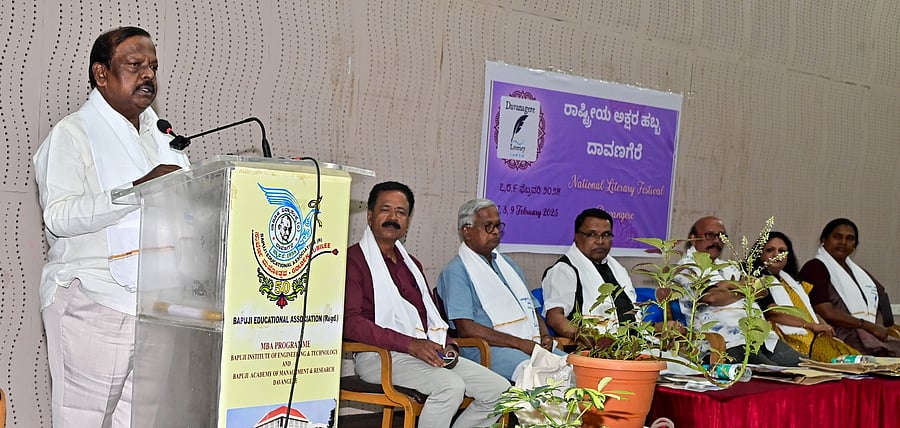
Writer L Hanumanthaiah speaks at the Rashtriya Akshara Habba-2025 in Davangere on Friday.
Credit: DH Photo
Davangere: “India is a confluence of many diversities. Dipping in flowing water is not the real Kumbh Mela. Understanding diversity and accepting it is the real Kumbha Mela,” opined writer L Hanumanthaiah.
Speaking at the inaugural programme of the three-day Rashtriya Akshara Habba: 2025 jointly organised by Davangere Literary Forum and Arasi Sanskrithika Vedike of Arasikere at the Bapuji MBA College auditorium in the City on Friday, Hanumanthaiah said mechanisation is not everything. Many professions including pottery, sculpture, blacksmithing, and leatherworking are disappearing due to mechanisation. This is also a contemporary problem of society.
“Living together without the pomp of marriage is a great revolution. The fact that inter-caste marriages are becoming normal in modern times is a silent revolution. Young writers should take note of this,” he said.
Gulbarga University Prof H T Pote asked whether the water used to wash the mother’s blood when a child is born better than the water of the Kumbh Mela? Should everyone go there (Kumbh Mela) and give birth?
Presiding over the event, Karnataka Sahitya Academy President L N Mukundaraj said parents have the freedom to choose the school and medium of education for their children. The Supreme Court has ordered that this is not a matter for the government to decide. “I agree with this. Parents should use the freedom given by the Supreme Court and enroll their children in government schools. It is not right to blame the government by enrolling our children and grandchildren in English medium schools. If writers, officials and public representatives enroll their children in government schools, the system will change. Government schools will develop,” he said.
Kannada Development Authority Chairman Purushottama Bilimale said as per statistics, most Indian languages are declining and preserving these disappearing Indian languages is a big challenge for writers.
He noted that many smaller lingual communities in India are disappearing, especially post-globalisation. In 1886, 55,000 people spoke the Koraga language but the number came down to 2,000 in the 2011 census.
“The language may disappear in the next 20-30 years,” he said.
Doordarshan’s Chandana channel programme head Aarti H N, storyteller Chandini, and journalist B N Mallesh also spoke. Programme co-ordinator Sriharsha Salimath gave the introductory speech. Many writers and thinkers from Karnataka and other states are participating in the literary fest.
